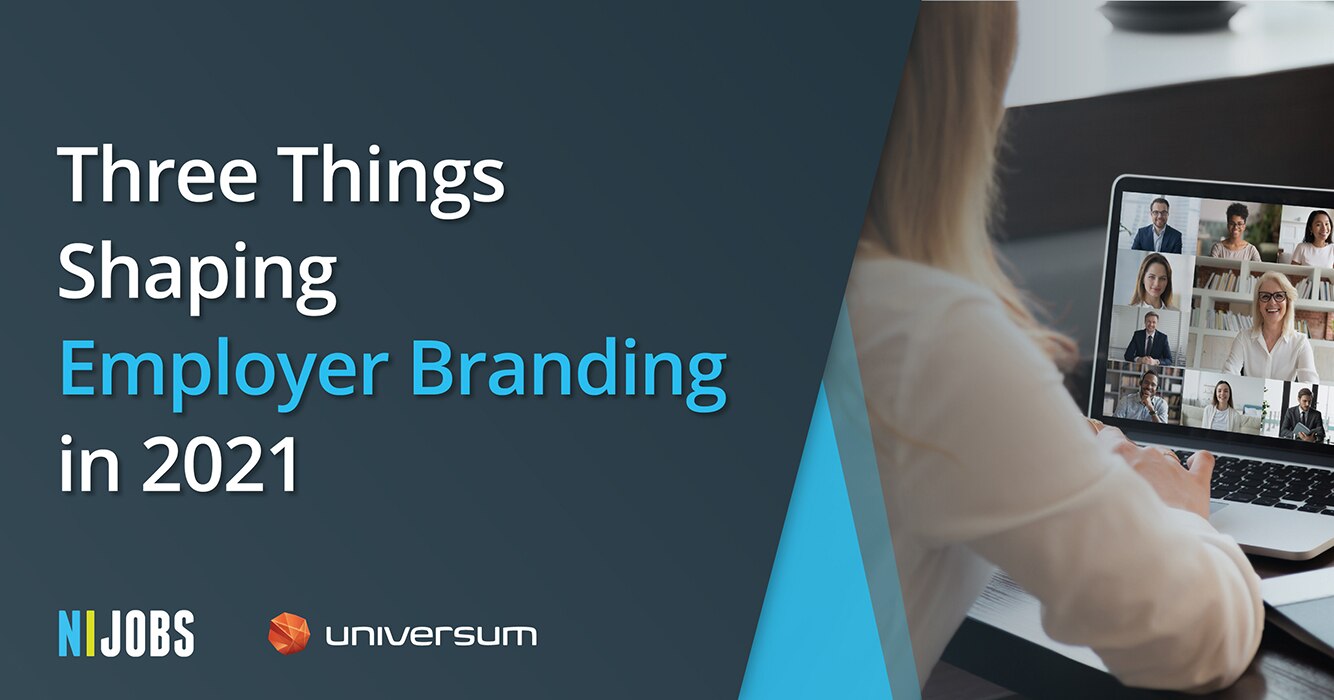Despite the fiercely competitive job market in Northern Ireland, SMEs emerge as a beacon of hope for employment growth due to their distinct recruitment potential. They offer employees something large corporations cannot – hands-on experience. Employees tend to experience a range of tasks and functions (rather than being pigeonholed), and the opportunity to learn at different levels and gain technical/specialist skills. In addition, employees working for SMEs have more career potential and opportunities for growth as they are more likely to be afforded the chance to have strategic conversations and engage with top management.
You don’t need to be a big corporate enterprise to attract the best candidates – you add value just as you are. You do, however, need to recruit differently. As a small- or medium-sized business owner, you may be searching for the right candidate at the right price. You may also be considering how the future growth of your company depends on your capacity to increase your headcount. Given these factors, it is likely that you require a quick turnaround time when it comes to filling your job vacancies.
In this article, we outline six key drivers of success for SMEs in the quest to find and retain great talent in an increasingly competitive employment landscape.
1. Considering the future staffing needs of your business
It’s easy to get caught up in daily tasks and admin when you’re running a small or medium-sized business. However, to ensure the future sustainability of your company, you will need to develop a solid growth strategy. Within your business growth plan, think about your future recruitment needs to get to where you want to be.
How much growth can be achieved with your current team? Are there any projects coming up in the next 24 months that may need ‘extra hands-on deck’? It’s important to know when to start hiring more people and what skill sets to look for in those new hires. Once you have your growth plan in place, it’s crucial to review and revise it at least once a year.
Understanding candidate behaviour is important when considering the future staffing needs of your company. The recent Job Report with NIJobs conducted research that revealed 30% of people are actively looking for a new job with respondents ranking “higher salary” (21%), “improve work-life balance” (9%), and “improve skills” (8%) as their top motivators when looking for a new role. Being aware of these factors is crucial when considering what you can offer future employees that other companies cannot.
Your growth plan can also serve as a valuable retention tool. Sharing it with your team will enable your employees to see the ‘big picture’ of your business, which may include greater responsibility and better compensation for them in the years to come – something to strive towards and a good reason to stay.
2. Optimising your talent acquisition strategy
In today’s competitive market, businesses are constantly seeking ways to optimise their talent acquisition strategy. With the limited pool of candidates available now in Northern Ireland, it has become crucial for companies to prioritise essential skills over rigid requirements. For example, a report developed by Hewlett Packard estimated that women would not apply for jobs they are qualified for unless they meet 100% of the requirements described in the job posting. However, men will apply for the position only having 60% of the required skills detailed. The report concluded from these findings that people who weren’t applying believed they needed the qualifications not to do the job but to be hired in the first place.
By focusing on the key competencies required for the role, businesses can ensure a more efficient hiring process while still finding qualified individuals. It is essential to carefully evaluate potential candidates and ensure they possess the necessary skills to meet the company’s needs. By adopting this approach, businesses can make informed decisions and increase their chances of finding the right talent for their organisation.
This makes SMEs remain agile, adapting to changing market conditions and filling critical positions more efficiently. Moreover, by carefully evaluating each candidate’s essential skills, SMEs can make informed hiring decisions that contribute to long-term growth and success.
3. Prioritising employer branding
Effective employer branding is about defining and effectively communicating the qualities that will make your organisation the first choice for the talent you want to attract. With the current age of digital transformation, jobseekers can access information about their employer brand through a variety of communication channels, including your job postings on NIJobs, social media accounts, and the company website.
Having the right employer branding in place is an important aspect of attracting the talent you need. In today’s competitive job market, it’s essential to differentiate your SME business from the competition, even the seemingly “safe” corporates. It’s also important for recruiters to understand the power of social media in effective employer branding. By leveraging your social media platforms, you can further enhance your employer brand and engage with a wider audience of potential candidates.
Successful recruitment begins long before you post your vacancy on NIJobs. Increasing your focus on engaging with passive candidates and dedicating part of your social media budget to educating people on the opportunities available to you is a proactive approach to recruitment that can position your business as an employer of choice.
4. Learning how to spot diamonds in the rough
Once you have completed a shortlist of the candidates that you’d like to invite for an interview, it’s important to consider how you will evaluate them during the interview process itself and prepare the questions you are going to ask. For example, you may wish to ask some questions that test a candidate’s soft skills. What experience has the candidate gained during their career and in their life journey that will help them to succeed in the role?
The way a candidate answers questions about accountability, communication skills, leadership, and teamwork will provide you with valuable insights about whether they will be a good culture fit. It is more likely that you will see a return on investment when you hire the candidate with the right soft skills. This doesn’t mean that qualifications should be ignored, but the right soft skills will bring more value to your business if the candidate is eager to learn and will fit into the culture.
A candidate’s body language can also be a strong indicator of what type of person is sitting across from you in the interview. Their gestures, expressions, and degree of eye contact may provide you with clues about how interested they are in the potential job as well as whether they will have a good relationship with other employees.
Measuring the candidate’s general attitude is as important as understanding the technical and soft skills they bring to the table. Ask further questions to help discover if the candidate mentions having problems working with colleagues or management in their previous role. Also, take the time to find out how well the candidate copes with heavy workloads, change, and time management. Employees with promising potential are often passionate about continuous learning because they tend to be curious about the world around them. Find out if the candidate is genuinely keen to acquire new skills and grow at your company.
5. Look out for red flags
Knowing the type of candidate that you’re looking for, including the personality traits that will resonate with the rest of your team, will help you identify any “red flags” during the interview process. Obvious red flags include rudeness, untidiness, or arriving late for an interview. However, there are some other crucial things to look out for.
Is the candidate genuinely excited about the opportunity that they are being considered for?
A good fit will be positive and upbeat about the prospect of working with you. If they are not, then this may be an indicator that they want the job for the wrong reasons.
Does the candidate refuse to take ownership of past mistakes or gaps in their career?
This is a serious red flag. Quality candidates will take personal accountability seriously and try to explain how they’ve learned from their past experiences and what they would change going forward in their careers
Has the candidate failed to ask any questions?
Essentially, interviews are intended to be candid conversations. A big part of this conversation comes down to the candidate asking relevant questions about your company, the role, and what their responsibilities will entail. Be wary if the candidate doesn’t ask any questions or if the questions they do ask are not relevant to the conversation you’re having.
6. Avoid costly hiring mistakes
For SMEs, making the wrong hiring decision can have dire consequences – particularly when the role requires interacting with your clients and other stakeholders – as every person you hire will essentially be a brand ambassador for your business. Apart from assessing a candidate’s skills and attributes, it is important to be aware of common mistakes made during the recruitment process that could significantly cost your business in the long run.
Many small business owners make the mistake of hiring without providing any clear documentation for the employee on how to do their job effectively. Not only should you unpack a new employee’s responsibilities in writing for them, but you should also give them an idea of your business strategy and key objectives for the next two years.
Another common hiring mistake is to simply hire an individual and disregard your gut instinct about their character simply because you have a critical skills gap in the business that needs to be filled. This is why it is crucial to contact the references provided by a candidate – do your due diligence to find out more about the individual and make sure they are not only a match for the skills required but a match for your company culture.
There is also the pitfall of not hiring enough talent. Small business owners, always mindful of budget constraints, tend to stretch the capacity of their existing team too far before hiring new people. This can result in reduced productivity and ‘burnout,’ leading to a decline in service delivery. When you eventually do take on new employees, they are more likely to fail due to being in a negative environment of exhausted colleagues and frustrated customers. This can then lead to high employee turnover, which only exacerbates the problem further.



